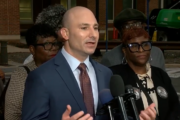If you’ve been invited back for a second interview, congratulations.
Getting to the next step is a fantastic accomplishment. And as you progress in the interview process, the interviewer may delve deeper into your experience to determine whether you’re a good fit.
Here are some actionable tips to help you ace the second interview and secure the job.
[See: The 25 Best Jobs of 2023.]
What Do Employers Want to Know in the Second Interview?
The second round of interviews can be nerve-wracking since this is the step where employers get to know each candidate on a deeper level to narrow down their options. But what exactly are they looking for in this stage of the interview process?
Here’s what executive coach Mary Lee Gannon says hiring managers want to know about you in the second round:
— Will this person be able to do the job without much help?
— Will they fit into the culture, or will they make me look bad?
— Can I trust this person?
— Can I rely on this person?
— Will they exceed expectations?
— Are they collaborative?
If your potential employer can confidently answer “yes” to all the above questions, you’re on your way to landing the job. “The second interview means the company is interested and is now comparing you to a select pool of candidates,” Gannon says. Bring your A-game to secure a spot in the third or final round of interviews.
Tips for Acing Your Second Interview
A second interview means you’re that much closer to receiving an offer and landing the job. Here are a few tips to help you ace your second interview and impress your future employer.
Know Who You’re Interviewing With
The second round of interviews is where the vetting process gets more serious, which means you could meet with “key decision-makers and those higher up the management ladder,” says career and leadership coach Ayanna E. Jackson.
In the invitation email for the second interview, the recruiting coordinator should let you know what to expect and with whom you’ll meet. Before the big day, Jackson suggests searching these decision-makers on LinkedIn and reading through their career histories to help you ask better questions and demonstrate your interest.
Thoroughly Research the Company
Jackson has noticed a trend among job applicants: They get so caught up in presenting themselves as the strongest candidate that they fail to research the company they’re interviewing with.
“Your second interview will focus on the specifics of the role in that department or division and how it impacts their needs and bottom line,” Jackson says. “A key miss is not knowing their industry, competitors, newest products or press coverage. This is where social media — and not just their static website — comes in useful for you to scroll through.”
So, take the time to research your future employer if you haven’t already. You can even reach out for informational interviews with someone from the company so that you’re fully prepared.
[The Best Companies for Work-Life Balance]
Prepare Your STAR Stories
STAR stands for situation, task, action and result and is a technique designed to help candidates prepare for behavioral questions by structuring their responses logically and concisely.
— Situation. Describe the event or situation you were in.
— Task. Explain the tasks you were required to achieve.
— Action. Describe the steps you took to complete the tasks.
— Result. What you achieved in the process.
“There’s no need to prepare 30 different STAR examples to draw from in your second interview,” says Andi Cook, a job search strategist and career coach. Instead, five well-crafted STAR stories should suffice since they could be applied to various questions.
Practice, Practice, Practice
If you’re fresh on the market and don’t have much interview experience, it’s natural to feel overwhelmed and unsure about yourself. Career coach Jess Wass suggests that you gain confidence and practice by taking interviews with companies you’re less excited about.
This approach helps you build up your experience before moving on to the companies you’re passionate about. “You never want to be in a situation where your first interview is with your dream company because you may not have had an opportunity to practice and get the kinks out of your interview delivery,” Wass says.
Questions That May Come Up During Your Second Interview
“During a second interview, the hiring team typically delves deeper into the candidate’s qualifications and assesses their fit for the role and the organization,” says Matthew Warzel, a certified internet recruiter and the president of the resume writing firm MJW Careers.
If you want to ace your second interview and stand out among other candidates, be prepared to answer some behavioral-based, company-specific and future-oriented questions.
Here are the three questions Warzel says are likely to come up in a second interview:
Behavioral-Based Questions
Example question: “Tell me about a challenging situation you faced at work and how you handled it.”
How to answer: “In my previous role as a project manager, a key team member unexpectedly resigned during a critical project phase and threatened our deadlines. To address this challenge, I immediately assessed the impact on the project timeline and redistributed responsibilities among the remaining team members. Through effective communication and quick decision-making, we were able to mitigate the negative impact and successfully complete the project within the original deadline.”
Company-Specific Questions
Example question: “Based on your research, what do you find most compelling about our company culture, and how do you think you would thrive within it?”
How to answer: “What stands out to me the most about your company culture is the emphasis on innovation and fostering a collaborative environment. I thrive in such an environment because I believe that diverse perspectives and open communication lead to creative problem-solving and growth. I know my adaptability, teamwork abilities and strong work ethic will allow me to contribute effectively to your company’s culture and drive positive results.”
Future-Oriented Questions
Example question: “Where do you see yourself in the next five years, and how does this position align with your long-term goals?”
How to answer: “Over the next five years, I envision myself taking on increasing responsibilities and making a significant impact within the organization. I’m excited about this position because it aligns perfectly with my long-term goals. I see it as an opportunity to further develop my leadership skills, deepen my expertise in (a relevant area) and contribute to the company’s strategic goals.”
[See: Bachelor’s Degree Jobs That Can Pay More Than $100K.]
Second Interview Do’s and Don’ts
Here’s what you should — and should not do — when you’re called back for a second interview with a potential employer.
Do’s
— Do prepare to ask questions. Remember, job interviews are a two-way street. They’re a chance for interviewers to get to know you, and vice versa. Before going into your second interview, prepare a list of questions to ask the hiring manager to ensure the company is the right fit for you.
— Do send a thank-you note after the interview. Just like how you sent a thank-you email after the first round of interviews, take the time to thank everyone you met in the second interview. Doing so shows that you’re respectful and will reiterate your interest in the company and the position.
— Do expect to discuss salary. If you didn’t discuss salary expectations with the hiring manager during the first round of interviews, expect it in the second round. Remember to defer salary negotiations until a figure or range is offered and avoid giving an answer if the employer refuses to share their budget first.
Don’ts
— Don’t slack off with your interview attire. Always dress to impress in every stage of the interview process. Since business formal is typically the standard interview dress code, ditch the T-shirt or athletic shorts and opt for a button-down shirt and suit pants.
— Don’t celebrate too early. Making it to the second round of interviews doesn’t automatically mean you’ve secured the job. So, have realistic expectations, stay humble and put in maximum effort to stand out among your competitors.
— Don’t repeat what you said in the first interview. The second interview is your chance to go more in-depth and show the hiring manager you’re the best candidate. So, make sure to provide specific examples and answer questions in detail.
More from U.S. News
The Best Jobs You’ve Never Heard Of
Best Jobs for Work-Life Balance
How to Make a Splash at Your Second Interview originally appeared on usnews.com
Update 07/20/23: This story was published at an earlier date and has been updated with new information.







